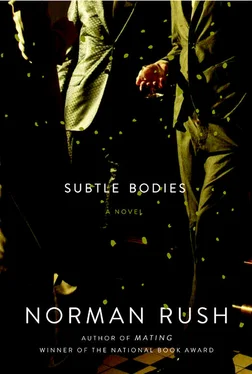Ned said, “It’s for Senate Foreign Relations. Next week the resolution authorizing force goes up. I’ll get a few more signatures around here and overnight it with the others I have on Monday.”
Joris shook his head. He made a negative sound. Ned stared at Joris. Gruen, not current in the stage their discourse had reached, said, “Another thing I never read was the sort-of-manifesto he wrote. It was against war. Strike When the Gorgon Blinks! It was a little long. I feel bad about it.”
“I never saw it,” Ned said, “so how long ago was this?”
“I don’t know. Wait, I think Grenada was in it.”
Ned turned to Joris. “They’re going to do it. Unless we—”
Joris cut him off. “I don’t care. Let them.”
Ned felt a pain inside as much like acute indigestion as anything else. It wasn’t indigestion and he was feeling cold.
“I don’t believe you,” Ned said.
“Believe me,” Joris answered, as Elliot rejoined them, beckoning.
• • •
The interior of the manse was a poem to money and woodcraft. What had it been like for Douglas to conduct his life in perfect hand-carved settings. They were being led to the kitchen. He would like to have a name for the style of the rooms when he gave Nina his account of the trip. Rustic modern might do it. I hate money, he thought, which is adolescent of me. Sometime after college, Douglas had fallen into a huge bequest. Had he known it was on the horizon when they were egalitarians together at NYU? Nothing had been said.
They entered the kitchen, a wonder of its own, like a layout for some glossy culinary-supply catalog. On the subject of money again, if he was correct it was Douglas who’d observed that you never had the full attention of someone with a large stock portfolio while the market was open.
There was Iva, and Iva was a splendid-looking woman. She was standing at the far end of the kitchen island, weeping but not sobbing, keeping on with some cooking project. They drew around her. Iva was slicing the poles off many small onions. She seemed incapable of saying more than Thank you, in a murmur, saying it over and over. Bread was baking. There was a pan of fresh biscuits on a side counter. The woman was evidently in a cooking mania. There were platters of sliced meat set out, warm meat, he gathered, because the plastic film covering the platters was fogged.
She embraced each of them. To Ned, she felt overheated. He thought, You blend an undertone of perspiration with a good perfume and it’s erotic. The kitchen was very hot.
Now she was chopping cilantro. Hell she was theatrically beautiful. She had a Tartar face, almost, a face from the image-world of vintage Russian movies or operettas like The Merry Widow . Her skin was tended-looking. Her shaped eyebrows were art. She had suave hair the color of brass. It was pulled straight back and a single heavy braid fell over her shoulder. She was wearing a too-big long-sleeved white shirt with a mandarin collar. About her sturdy bosom the less said the better. She was wearing black elf pants. He didn’t know any other name for them. She was forty-three. Nina was six years younger. Iva was barefoot. She was solid. Nina would say she could stand to lose three or four pounds. Naughty Marietta was another light opera.
That was it for the cilantro. She had expertise. She had moved on to opening jars of pimentos and artichoke hearts. She said, with difficulty, “I know you are all hungry.” Everybody nodded vigorously to vindicate her berserk industry. It was funny to Ned that she still sounded so German after living in America as long as she had. Of course, she was Czech, but Czechoslovakia had been part of the greater German culture-zone, so possibly she sounded Czech, in fact. How would he know?
The grouping in the room was odd. Elliot was standing apart, superintending. The others had all been able to make some kind of personal condolences to Iva, and Ned hadn’t. Now Elliot seemed to be nudging the group prematurely toward the dining room.
Ned touched Iva’s arm. He said, “I loved Douglas. He was my friend and I loved him.”
He’d had no intention of soliciting a second embrace. But possibly he had moved too abruptly, judging by her reaction, a vehement gesture that utterly baffled him. She seemed to be pointing at her armpits.
Elliot interpreted the moment for him in low, tight words, to the effect that she felt she hadn’t had time to clean up properly. It was odd. She had embraced everybody freely a minute earlier. “She’s fragile,” Elliot said.
Iva said, “Tomorrow we can sit.”
“Sure,” Ned said.
“She was in Kingston seeing the body today. She’s exhausted,” Elliot said.
She undid two or three shirt buttons, pulled the front of her shirt forward and shook it. More tears came, and tears and perspiration seemed to be uniting in a yoke around her throat.
Ned wanted to say something about Hume, or rather to Hume. The boy’s father was dead. Ned wanted to tell Hume he had loved his father. Then he would have said it to both of the survivors and he would be easier waiting for the next developments. “Is Hume here?” he asked, keeping any urgency out of his voice.
Iva seemed to be trying to formulate something to say. The effort failed. Elliot was beside her, consulting, and then almost immediately leading her away. He pushed his palms toward the friends, briefly, to enjoin patience. It was confusing. Elliot said something about eating in the kitchen as he left. There were stools that could be pulled up to the island.
“Hume is here,” Joris said, pointing to a doorway.
Iva was gone. Raised voices were coming from somewhere else in the house.
“My boy Hume! Come over!” Joris said. He was being cordial but his voice was too loud.
Standing half in shadow in a doorway in the back wall of the kitchen was the person Ned had glimpsed earlier, the running person.
The boy was strongly built and seemed tall for his age of fourteen or fifteen. He was ruddy. He wore his hair in a double Mohawk, something new to Ned. He was dressed in leather, black pants or chaps and a vest. There was a symbol hanging around his neck, metal, not a cross, large. He stepped out of sight. Joris dashed after him. He returned quickly, defeated. Elliot came into the room. He looked pink. Ned thought, Dislocation everywhere. Gruen had placed stools around the island and was already furling back the plastic wrap on one of the meat platters.
Let’s get in a circle and wring each other’s hands, Ned thought.
“I have to return phone calls,” Elliot said, but sat down and began pushing platters around.
Gruen surveyed the collation and said, “There are scones here someplace.”
Where had Hume gone? Joris was off looking for him again somewhere in the bowels of the woodbutcher’s palace, as Douglas had referred to his house. Again Joris was back. Gruen had decanted pan drippings into a teacup. Now he was rolling slices of veal into tubes and carefully making them au jus before each bite.
Elliot said to all of them, “I know we haven’t had much time to talk, and I apologize. Tomorrow we will. Right now I have the phones turned off, but I have to put the system back on. I have a bunch of saved calls I have to answer. It’s been crazy here. Press is coming, a man named Fusco, Dominique Fusco, might show up tonight. We might see some police around. It has nothing to do with any of you, of course. Loose ends is all. And I’m trying to get a doctor to come in for Iva. But you should eat.”
Joris was at the massive refrigerator. Opening both doors wide, he said, “Looking for the butter.”
Elliot rose and said sharply, “Don’t touch anything in there. She doesn’t like it … because, ah, because everything’s arranged. Everything you need is on the counter.”
Читать дальше











